Likes UP: Authority, The Liking Authority and Semantics

Likes UP: Authority, The Liking Authority, Instant Authority and Semantics
In my “other life” I am a linguist. In fact, a Love Linguist®.
The structure of our language merges with our thoughts and even what we are searching for online. Google recently added Verbatim to their search because many people don’t use quotation marks around a phrase.
When it comes to LIKING and AUTHORITY, check out this post.
Even though the article referenced below by Peter Morville is from October 2005, it is even more relevant today. I wanted to share it and immediately contact Peter on Google Plus.
Peter is an authority on information architecture and findability. (the beauty of English is that you can make up words like findability)
He clearly has a passion for etymology and linguistics and ties this into the semantics of computer language.
One of my favorite lines from the article is “Google is worth nearly $90 billion because Google helps us find what we seek. And Google has delivered superior findability via a multi-algorithmic approach.” Now with G+ in the works their power will explode. Facebook didn’t see it coming. Tagging, plus +1, viral sharing, truly create the World Wide Web and all its connections, backlinks, with Google as the biggest AUTHORITY promoter.
Google+ Business Pages Directory has just been added to G+. Add your business page by clicking on the image below:
Here’s the AUTHORITY article from Semantic Studios:
(excuse the broken links; this article is from 2005)
I have a problem with authority. It’s not that I’m independent, insubordinate, and contrarian. I am, but that’s not my problem. My problem is with the rising abuse of the word amongst bloggers, wikipedians, folksonomists, and other social software activists.
In the good old days, not so long ago, in the context of the written word, authority was a term used primarily by librarians as a criteria ofevaluation. Along with accuracy, objectivity, and currency, we judged source authority. Who is the author? Who is the publisher? What are their individual and institutional qualifications and reputations? Have the contents been edited and refereed? Is this an authoritative source?
But then, authority was appropriated by the Technorati mob, where it swiftly lost definition in a tangled tag soup of popularity, power, trust, credibility, and relevance. These words were tossed around indiscriminately in a Bacchanalian festival of semantic anarchy.
For those of us who value a taste of hierarchy along with our hypertext, things were beginning to look a bit dicey. Fortunately, before the tag clouds could totally eclipse the sun, a new entity emerged as a source of authority and illumination.
The Wikipedia
Just as we feared that nobody was in control, the world’s largest, most accessible, and most widely used encyclopedia appeared to reassure us that, to the contrary, everybody is in control.
From evolution to intelligent design, the accuracy, objectivity, and currency is surprisingly good. And, in fact, the entry on authority is really quite helpful:
People obey authority out of respect, while they obey power out of fear…Authority need not be consistent or rational, it only needs to be accepted as a source of permission or truth.
The article describes Maximilian Weber’s three types of authority (traditional, rational-legal, charismatic) and offers links to related concepts like law, power, and trust. Or, at least it did at the precise moment in time when I visited. The words may since have changed.
But this fluidity, while problematic for citations, does not by necessity harm its cognitive authority. Now, some old-fashioned librarians may claim that due to the pseudo-anonymous, multi-author nature of the Wikipedia, its articles have no authority. But they’d be wrong. Authority derives from the information architecture, visual design, governance, and brand of the Wikipedia, and from widespread faith in intellectual honesty and the power of collective intelligence.
Of course, sometimes trolls intentionally post lies, and sometimes amateurs mistakenly post untruths, but before we cast stones at the Wikipedia, it’s worth revisiting our faith in the authority of traditional printed sources, for even the revered Encyclopaedia Britannica is riddled with errors, not to mention the subtle yet pervasive biases of individual subjectivity and corporate correctness.
And anyone who reads newspapers, books, or academic journals knows things are only getting worse. As the industry endures a perfect storm of rising competition and falling readership, traditional publishing has entered an era of error. Proper spelling and punctuation are but trivial casualties in a war of attrition that long since killed off the fact checkers.
The Hyperbole of Folksonomy
In this disruptive milieu, the emergence of the Wikipedia as a poster child for bottom-up publishing and collaborative categorization (along with the relatively minor successes of de.licio.us and Flickr), has inspired a motley crew of rapture-ready anarchists, anti-taxonomists, and folksonomy fetishists to predict not just the demise of traditional publishing but the end of hierarchy itself.
Though folksonomy was born on an information architecture list, it was quickly hijacked by the Technorati. Says Dave Sifry:
Tags are a simple, yet powerful, social software innovation. Today millions of people are freely and openly assigning metadata to content and conversations. Unlike rigid taxonomy schemes that people dislike, the ease of tagging for personal organization with social incentives leads to a rich and discoverable folksonomy. Intelligence is provided by real people from the bottom-up to aid social discovery. And with the right tag search and navigation, folksonomy outperforms more structured approaches to classification.
Now don’t get me wrong. I like tags as much as the next geek. And I enjoy the revolutionary rhetoric of the free-tagging movement, to a point. But when Tim O’Reilly, the publisher behind the lemur and polar bearbooks, starts predicting the death of taxonomy, it’s time to set the record straight.
You see, tags are only the visible, superficial symbols of a much deeper, more interesting revolution in findability and authority. Wikipedia doesn’t beat Britannica because it has better folksonomies. It wins because it’s more findable. And its success didn’t come without structure. In fact, the Wikipedia has a traditional information architecture (with strong design conventions and a fixed left-hand navigation bar) and a traditional governance model (with Jimbo Wales and his Board of Trustees as the ultimate corporate authority).
Of course, the Wikipedia is only a foot soldier in this revolution led by Google. After all, Larry and Sergey were the first to capitalize on folksonomies in the 1990s with the advent of the PageRank algorithm which uses links as indicators of authority and aboutness. In this sense, Google is by far the biggest story in free tagging. And along the way, Google has taught us a couple of lessons:
- It’s the Findability, Stupid!
- The Revolution is Multi-Algorithmic.
Google is worth nearly $90 billion because Google helps us find what we seek. And Google has delivered superior findability via a multi-algorithmic approach that recognizes the value of:
- Full Text. Matching keywords in the query and content.
- Information Architecture. Analyzing the internal link structure and hand-crafted metadata of each web site.
- Free Tagging. Leveraging the links between web sites.
And while famous Googlebombs like miserable failure show us that sometimes the authority of the masses can redefine the aboutness of the object, usually there’s a good match between the words of the author and searcher. As leading indicatrs of semantic serendipity, the folksonomies of Flickr and del.icio.us are cool, but when it comes to findability or re-findability, stacked up against Google and Google Images and Google Desktop, they barely merit attention.
Authority Unbound
Herbert Simon’s conclusion that we satisfice under conditions ofbounded rationality was decidedly optimistic. Anyone who’s studied bias in decision making knows that “unbounded irrationality” is a more fair and balanced description of human psychology and behavior. Well-documented decision making traps include:
- Anchoring. When considering a decision, we are unduly influenced by the first information we find.
- Confirmation. Through selective search and perception, we subconsciously seek data that supports our existing point of view, and avoid contradictory evidence.
This puts into context the amazing power of Google and the Wikipedia and other highly findable sources of information to influence what we learn, who we trust, and how we make decisions.
Of course, we must also recognize the power that devolves to the individual in an open media landscape that enables us to select our sources and choose our news. In today’s Google economy, we are increasingly becoming our own authority.
The real upheaval lies just ahead, as a generation of school kids (and their teachers and librarians) struggle to reconcile traditional notions of education and objectivity and authority with the constructivist web ofsocial facts and collective intelligence where folksonomies flourish and the truth is a virus of many colors.
Comments on Authority:
Martin Sigaard | October 12, 2005 3:45 AM
I could not have said it better. But then again, I’m a librarian struggling with no-service search engines replacing multi-field databases, pre-prints and homemade online magazines replacing peer-reviewed articles in journal from physically verifiable publishers, and so on…
“Tagging” as you call it is probably yahoo for surfers, but for reference work it is worthless at best.
Looking forward to the hierarchy renaissance.
Peter Morville | October 12, 2005 11:06 AM
Not all librarians agree. Check out the reactions on LISNews…
http://geek.lisnews.com/article.pl?sid=05/10/12/0737258&tid=
…and the emerging thread on Web4Lib:
http://lists.webjunction.org/wjlists/web4lib/2005-October/038575.html
Grant Campbell | October 12, 2005 12:14 PM
Yes, this is an important, well-written and illuminating article. Not that you particularly need MY affirmation, Peter, but here it is, anyway: congratulations.
Since I’m not in the mood to field endless student inquiries about their essays, I’d like to tackle one issue that Peter addresses early on: the issue of authority. He states:
“In the good old days, not so long ago, in the context of the written word, authority was a term used primarily by librarians as a criteria of evaluation. Along with accuracy, objectivity, and currency, we judged source authority. Who is the author? Who is the publisher? What are their individual and institutional qualifications and reputations? Have the contents been edited and refereed? Is this an authoritative source?”
That’s quite true. But it has also been used in another way, and the collision of these two meanings of “authority” goes, I think, to the core of the social software message.
Here’s Lois Mai Chan’s definition of a Name Authority Record in a library catalogue:
“A record that shows a personal, corporate or geographic heading in its established form, cites the authorities consulted in determining the choice of form of name, and indicates the references made to the heading.”
Here’s the DRA Authority Record for one of my icons, Bette Davis:
Heading:
* Davis, Bette, 1908-
Used for:
* Devis, Bett, 1908-
* Davis, Elisabeth Ruth, 1908-
* Davis, Ruth Elizabeth, 1908-
Source data found:
* Duke, V. Two’s company.
* Champion, I. Bette Davis, c1986: t.p. (Bette Davis) cover flap (Elisabeth Ruth Davis) p. 5 (Ruth Elizabeth Davis)
* Stine, W. “I’d love to kiss you– ” c1990: CIP t.p. (Bette Davis) galley (d. 1989)
Notice something? According to the “authorized” heading, the old girl is still alive, still trashing her daughter, still griping about Joan Crawford, still smoking and drinking up a storm. The source data notes that she died in 1989.
But the heading still says, Davis, Bette, 1908- .
Why does this matter?
It doesn’t.
Why doesn’t it matter?
Because an authority file derives its value, not from being complete, but from being unique.
“Authority,” in an authority file, means the FORM OF THE NAME THAT THE LIBRARY HAS DECIDED TO USE. There is no explicit obligation to libraries to answer for the accuracy, completeness, or appropriateness of the heading, as long as there are no other Bette Davises who could be confused with that heading.
There’s nothing wrong with using authority files, or with calling them authority files. But let’s be clear: “authority,” in this case, does not mean “accuracy, objectivity and currency.” It means uniqueness for the purposes of the information system. It does not mean “Davis, Bette, 1908- ” is the best, most intuitive, most accurate, most complete representation of that entity who once cried “What a dump!” It simply means that “Davis, Bette, 1908- ” is the name we’ve decided to call that entity, and whether that’s her real name or not, whether she’s dead or not, whether or not she was really James Cagney in a boustier, if you want to find her movies in our library, you’ll have to use that name.
Every system, even the loosest system, has rules, and if you want to use the system, you have to play by the rules. But not every system calls its disambiguation rules “authority,” while at the same time trumpeting the virtues of authority as the presence of accuracy, objectivity and currency.
I cheerfully use authority files, and I cheerfully teach my students how to make them and use them. Authority files fascinate me.
But I really can’t blame the tagsonomists and folksonomists for saying “enough, already.”
But enough, already. I’ve droned on longer than I intended.
aqotwf_emr | October 12, 2005 8:05 PM
This is a very interesting article for a person like myself, who had always considered the Encyclopaedia Britannica as an infalliable resource (to the publication time of the particular edition) and has been tackling categorisation/nomenclature at an near intrinsic level since discovering the social construct of classification.
I also happen to be one of Grant Campbell’s students, and since I’m not in the mood to enter the concluding paragraph to his assigned essay (due tomorrow), I offer a reflection on “Authority in an authority file” – since I had to sit through the entire 150 minute lecture that included the “Bette Davis 1908-” allusion nearly word for word as transcribed here (and I believe I was the first to spot the actual death date in the source data).
We have learned (reluctantly) that 1908- does not matter in a heading, because “an authority file derives its value, not from being complete, but from being unique”. In the case where authority records were being made for persons with the same names, for example, we generally could use the birth date of that inidivual as the “uniqueness tag”, as odds are in favour of them having completely different birthdates. For us novice cataloguing students, this “unique” facet of an authority file can satisfy our end-user needs. However, what about authority outside the realm of the library – a realm such as this one, where I deliberately left my name off as an identifier for the purpose of creating this example.
The authority file is aqotwf_emr, and the source is all this text I have typed out.
aqotwf_emr is an adequate authority for a dispassionate statement posted on a site like this (except for Grant Campbell, who is probably wondering which of his graduate students had the nerve to post this), but suppose the situation was where I posted on a site associated with criminal activity, and the RCMP (another authority representation) needed a name for a warrant (leaving the possibility of tracking my IP out of the scenario). The authority file is simply aqotwf_emr, which is NOT as unique as one may think – this is derived partially from an email address, and at the time the account was established, the tag “aqotwf” had already around 8 or 9 subscribers, and to avoid being “aqotwf09”, I added “_emr”. The reason why this occurred is that the letters actually represent the title of an internationally-known novel, and presumably, the other subscribers out there had the same penchant for it when establishing their authority files.
aqotwf_emr is definitely unique in the sense that no one else has yet to use it, or if they have, the domain name after @ would differentiate it as such… but is such a moniker the best model for authority? This gives no indicator of the person behind the authorship, and thereby abdicates any responsibility on CONTENT. At the catologue level, this does not matter, because the purpose is to be able to look up aqotwf_emr in a database to find corresponding works, but I don’t support this as an ideal in Real Life (excluding situations where altered authority is necessary in the face of a true imminent threat) as authority and responsibility go hand in hand. As a writer, who has had commentaries (often on controversial “hot topics”) published in newspapers, it is my practice to sign my name in full – not because I want to flaunt adeptness in expression or be cited by someone else (if ever that were the privelage), but because I claim responsibility for the content I wrote – accolade and adversary alike. Nothing infuriates me more when I read a full-length letter to the editor and see it signed as Mr. and Mrs. [first and last name here], because unlike the torrent of multiple authored journal articles I read, I am quite certain that the majority of such letters are written only by the “Mr.” or the “Mrs.” and yoking the titles with AND does not split responsibility 50-50, but rather nearly eliminates it entirely.
How far should we carry a construct of authority in practice? Should we have a single representation that emcompasses theory and practice, or does every situation require a different set of authority principles?
That being said, and since I have mentioned my own philosophy of responsibility, I will reveal my real name on this forum on October 14th, 2005… unless Grant Campbell has been able to deduce which student I am, in which case he can post it.
aqotwf_emr | October 14, 2005 2:58 PM
As I promised when posting the last comment, I am revealing my Authority File as acknowledgement of taking responsibility for my writing: Karina Miki Douglas.
Ultimately, as Grant Campbell alluded to in his Bette Davis 1908- example, using this in place of aqotwf_emr should not make any difference, as there in this context there is no way to empirically prove this file is linked to the source text above; we have to rely on the “honour code”.
David Gratton | October 15, 2005 5:38 AM
Nice. Very articulate. I wrote something regarding the folly of taggin as a method of discovery at:
http://www.davidrdgratton.com/archives/2005/05/flickr_has_us_l.html
Although, I also think taxonomies are not much better and are on their way to join the Dodo (slight exaggeration). A hierarchy can provide a level of context they still do not address issues around quality and to a similar extent relevance. As information grows taxonomies break down; not only because of increased granularity, but because of crossover (I’m sure librarians have a term for this): different categories and different levels within the heirarchy. Take music for example: a typical song from Massive Attack or Tricky before trip-hop entered the lexicon, we could say:
Jazz
Urban > Rap
Rock
R&B > Funk
Solution:
A New Catagory: Trip-Hop
Get the librarians to agree and file it. This is a massive bottle neck and cannot keep up with the tidal wave of information.
Peter Morville | October 17, 2005 9:46 AM
Although far from a panacea, faceted classification is a way to address the issue of polyhierarchy (what you call “crossover”) and to alleviate the bottleneck to a degree.
For more on facets, see:
http://semanticstudios.com/publications/semantics/000003.php
http://peterme.com/archives/00000063.html
http://www.boxesandarrows.com/archives/all_about_facets_controlled_vocabularies.php
http://en.wikipedia.org/wiki/Faceted_classification
http://besser.tsoa.nyu.edu/impact/f95/Papers-projects/Papers/perles.html
David Gratton | October 18, 2005 9:41 PM
Hi Peter,
Great articles, Very insightful, but I am not sure it really addresses the issue I see. I think I get the multiple pathways or faceted navigation, but using your example:
Wine can be a: Merlot or a Chardonnay it cannot be both.
But music (my Tricky example) can be: Jazz and Rap.
We could argue it is neither Pure Jazz nor Pure Rap (whatever pure means – a clasification debate on it’s own), and we now need to have a new genre. And a Merlot Chardonnay could be a new blend (I suppose…) But new classifications are a massive resource and work flow bottle neck.
I think your excellent article “The Speed of Information Architecture” supports an assertion that Taxonomies do not evolve fast enough especially for “layers” exhibiting fast rates of change, like culture. Take Johnny Cash for example. In 1990 he is probably rightly classed as Country Western. By 1996 he is closer to alternative rock-n-roll.
To be an effective search mechanism, isn’t it valid to say that Taxonomies require broad agreement. In todays information tsunami are Taxonomies, facted or not, really the way forward?
I think we need something more dynamic and fluid.
Peter Morville | October 19, 2005 9:08 AM
Thanks for articulating this so clearly David. In general, I like the notion of taxonomies occupying a slower, more stable layer and rapidly evolving folksonomies (free tagging) as a complement. Over time, the collective intelligence that’s embedded in the folksonomies can be integrated into the taxonomies.
But any generalization will be flawed. In some contexts, taxonomies will be all that’s needed, and in others folksonomies will flourish. With respect to information architecture and search and findability, one size does not fit all.
chircu.com | November 2, 2005 3:31 AM
Peter, the folksonomies you are talking about are not that new. I can think for example of the participative democracies (ancient Athens’), or of the oral age (before literacy/movable type). In such instances, you had ad-hoc, fluid, hierarchies, limited in space and time. Not unlike what is taking place under our own very screens.
adrian chan | November 9, 2005 4:03 PM
Peter,
Interesting coverage of what’s happening. I’ve got an authority problem also. There are several phenomena at play here, and I think it would serve us well to tease them apart.
Authority means many things. Among linguists, it involves having the normative authority to make certain authoritative claims. I can’t arrest you with the words “you’re under arrest”; I don’t have the authority, for the reason that I don’t occupy that *social position.* Social position is the means by which authority is transferred from position to person (who then plays that role).
We’re seeing that type of authority eroded on network news, to wit, the decline and fall of the “voice of God” anchorman. (it is men, after all.) Now, that phenom is spilling into the world of journalism, which is to say:
–journalism as the domain of information
–news and its distribution/circulation
–news and its publication
–news and its authorship
I think that we can all put together the ways in which new media undermine authority in each of the above points.
What’s interesting in the Google/Wiki world then is that collective authorship can claim authority, and it’s interesting because there are at least two mechanisms at play:
–that the majority is right (the value of links in Google rankings; the intelligence we impute to collective editorial work (wiki). Numbers count, in other words.
–the rise of a “collective” brand, or a brand whose authority as source obtains from its collective identity. Again, a movement away from voice of God authority.
What’s unclear to me is the relation between authority and expertise. I know your column is on authority, but underneath it is “expertise.” The two are different. We don’t need to refer to the Biblical “meek,” nor to Nietzsche’s sheep, to know that the masses can be wrong!
cheers!
adrian
Peter Morville | November 9, 2005 5:38 PM
Thanks for teasing things apart Adrian. I agree the distinctions and relationships between authority and expertise are important. Personally, I think we need to rely on multiple sources or balanced solutions that draw upon the wisdom of the crowd and the knowledge of experts.
Isanger’s article about Wikipedia anti-elitism is interesting in this vein:
http://www.kuro5hin.org/story/2004/12/30/142458/25
smartypants | May 8, 2007 10:33 AM
I just wanted to chime in with the view of “authority” in a legal context. I am always a bit annoyed when too much praise is given to the Google’s PageRank because I see it as just another old concept applied in a new context. PageRank really seems to be nothing more than a citator in scholarly publishing (called Shepards in the legal field), where the authority (or rank) given an item is based on the number of links (or cites) to that source.
The concept of legal authority is often a complex blend of four measures: (1) the number of inbound citations (i.e., the majority-is-right type authority), (2) the expertise of the court in that area (the federal court in southern California is seen as an expert on entertainment law), (3) the level of court doing the citing (a mix of expert authority and indirect hierarchy), and (4) the direct jurisdictional power of the citing court in relation to “user” (direct hierarchy).
Judges are consantly faced with questions of weighing the authority of previous court decisions and they rely on the above measures in making those decisions. All four are not always present and judges often juggle those measures that are present to arrive at an overall measure of authority.
Also interesting is the fact that the legal field has recognized that majority-is-right authority alone can lead to faulty results. The most cited legal opinion of all time is a case known as Anderson v. Liberty Lobby (a case often included in the boilerplate of a decision). Yet, Anderson is far from the most influential or important court decision. Similarly, an internal analysis of links within a website might find that the copyright page is the most linked too page, but I don’t think most people would consider it the most important.
Peter Morville | May 8, 2007 3:33 PM
Thanks for explaining legal authority and the judicial algorithm! This 2007 paper…
Is Relevance Relevant?
http://jcmc.indiana.edu/vol12/issue3/vancouvering.html
…about search engine quality and bias and the merits of metrics of relevance and customer satisfaction is also worth a look.
Thanks to Peter and all the folks who commented on Authority
Now onto “Instant Authority”
Establishing INSTANT AUTHORITY at the Speed of a CLICK
I have been watching with fascination how two basically unknown young men, both named David, became instant authorities “almost overnight” with the power of the internet.
The desperation of folks looking for a source of income, the easy of use (just blog, promote, collect money) seems almost too good to be true!
They come from lowly beginnings, get rich quick, and now share with every they can do it too! Not exactly that way but sounds good.
All the bells and whistles are in the headline.
The “regular price” shown in the image below is new. It was promoted as $25. You pay $25 per month (which is not clear) for your blogging platform with a promotion to the Empower Network.
There are $100 and $500 options as well. If people ordered the straight $25 option that would mean David attracted over 9000 customers in three weeks – impressive.
That would make him an internet authority in anybody’s books!
But the responses in the live chat are what really show that David has convinced the audience he is an authority:
”100% Legit, these guys are industry leaders and would never put their rep on the line like that”
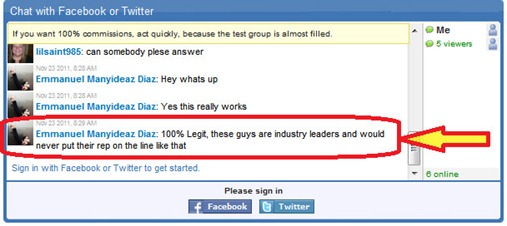
One customer is trying to convince another customer. Getting others to believe in you and do your selling for you makes your rise to Authority easy!
To have hundreds of people watch you on a two hour webcast gives you a platform for authority.
Alexa states they are the The Global Leader in Analytics (now that’s self-proclaimed authority).
What the two David’s have done is get other people to pay at minimum of $25 for a blog (multi-user) on their site to grow content. Currently there are 1549 backlinks which give search rank authority.
The blog pages have a similar look with links to affiliates order page to join the “network.”
The rating for the site has grown rapidly and gives authority to the site for the owners, the two Davids. The individual who blogs to create content for the site owner even if they quit has still created value for the domain owner giving more authority in the search engines. Traffic Rank is shown world below.

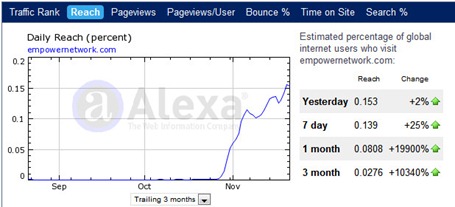
Interesting to see members create their own sites to promote. It is all about being seen as THE Authority and not just one of many.
#likesup on Authority


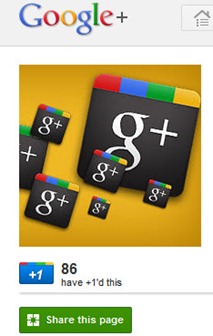




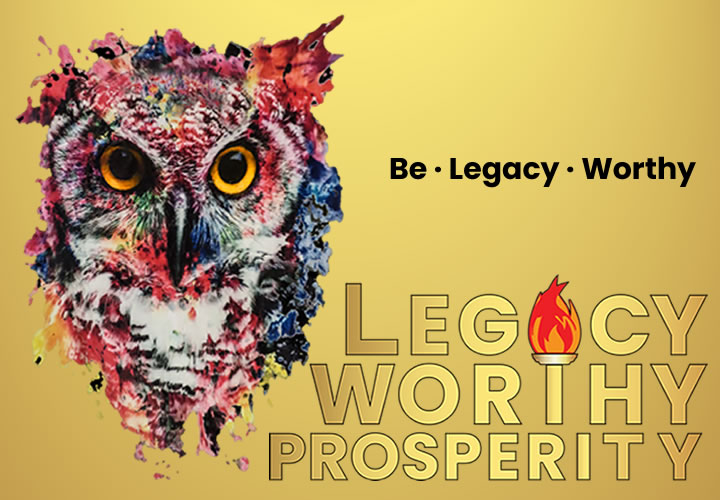
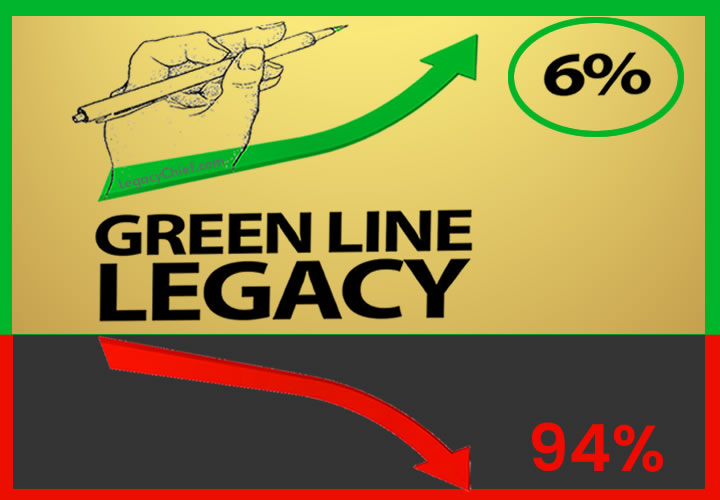
Comment “Likes UP: Authority, The Liking Authority and Semantics”